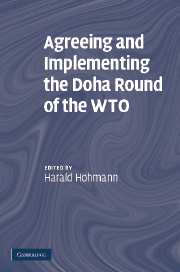Book contents
- Frontmatter
- Contents
- List of Contributors
- Foreword
- Introduction
- The future of the Doha Round
- PART ONE Development policy of the WTO
- PART TWO Trade policy (including competition) and trade facilitation
- PART THREE Reform of the dispute settlement system
- PART FOUR Social rights, health, and environment
- 15 Trade and human rights at work: Next round please …? Regulatory and cooperationist approaches in the context of the Doha Round
- 16 Food safety issues under WTO Agreements
- 17 Trade and the environment: With particular reference to climate change issues
- 18 Live with a quiet but uneasy status quo? An evolutionary role the appellate body can play in resolution of ‘trade and environment’ disputes
- 19 Health, environment and social standards in the Doha Round: Comparison of visions and reforms needed and the results achieved
- PART FIVE Conclusions
- Index
15 - Trade and human rights at work: Next round please …? Regulatory and cooperationist approaches in the context of the Doha Round
from PART FOUR - Social rights, health, and environment
Published online by Cambridge University Press: 23 February 2010
- Frontmatter
- Contents
- List of Contributors
- Foreword
- Introduction
- The future of the Doha Round
- PART ONE Development policy of the WTO
- PART TWO Trade policy (including competition) and trade facilitation
- PART THREE Reform of the dispute settlement system
- PART FOUR Social rights, health, and environment
- 15 Trade and human rights at work: Next round please …? Regulatory and cooperationist approaches in the context of the Doha Round
- 16 Food safety issues under WTO Agreements
- 17 Trade and the environment: With particular reference to climate change issues
- 18 Live with a quiet but uneasy status quo? An evolutionary role the appellate body can play in resolution of ‘trade and environment’ disputes
- 19 Health, environment and social standards in the Doha Round: Comparison of visions and reforms needed and the results achieved
- PART FIVE Conclusions
- Index
Summary
Introduction
The Doha Round, which began with much ambition and great expectations as the ‘Development Round’ in the context of the tragic incidents of September 11 2001, has been suspended without agreement in June 2006. Notwithstanding the lack of agreement, a significant commitment to development was demonstrated. One example was the commitment to abolish tariffs for least-developed countries (LDCs) under the ‘Everything but Arms’ initiative within the European Union (EU) Generalised System of Preferences (GSP). Improved market access for agricultural exports from developing countries today appears more closely connected to conflict prevention than it was before September 2001. The Doha Round has the potential to contribute to raising standards of living and openness in yet-closed societies in certain parts of the world. Trade can stimulate economic integration between countries and cultures that have been in conflict – European economic integration after World War Two is an often-cited example for how trade can, in the long run, substitute aid which was initially provided under the Marshall Plan.
The ongoing round of trade negotiations, though currently on hold, is likely to survive and be shaped by the experiences gained from the previous round. The Uruguay Round, that ultimately gave birth to a bundle of new agreements and set up the World Trade Organization (WTO) – both unique achievements in the history of world trade – had to overcome many breaks and took eight years before it was successfully completed. Contrary to the claim that anything but a rapid consensus will harm the WTO institutionally, the delay is an opportunity to take a breath and rethink positions, constellations and potential areas for consensus building.
- Type
- Chapter
- Information
- Agreeing and Implementing the Doha Round of the WTO , pp. 335 - 373Publisher: Cambridge University PressPrint publication year: 2008



